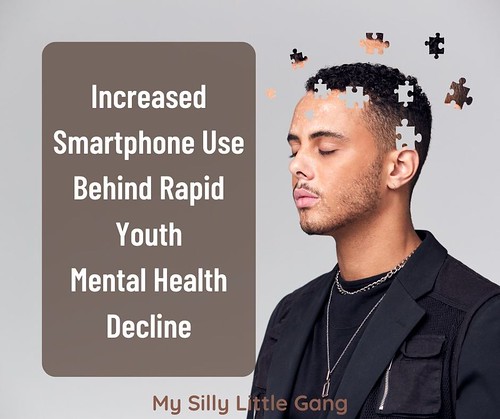Do you worry about how much time your children spend on their phones? I know I sure do. My youngest 11 doesn’t have a phone yet but the other two who are ages 15 and 17 do. I hope you find this article with research that increased smartphone use is behind rapid youth mental health decline useful. Let me know what your thoughts are down in the comments.

Increased Smartphone Use Behind Rapid Youth Mental Health Decline

New data from non-profit Sapien Labs suggests that increased smartphone use has caused a rapid decline in youth mental health. Before the age of the internet, young people spent up to 25,000 hours interacting with peers and family in person by their 18th birthday. However, the rise of the internet has reduced this to under 5,000 hours.
New Data Reveals Increased Smartphone Use Could be Link
to Decline in Mental Wellbeing In Young Adults
The growth of smartphone use and an increase in social isolation point to a decline in the mental health of young adults ages 18-24. That’s according to Sapien Labs’ recently released, “Mental State of the World Report 2021,” which found that mental wellbeing has been declining with each younger generation over the past decade.

“Data shows that people now spend 7-10 hours online,” says Tara Thiagarajan, Chief Scientist at Sapien Labs. “This leaves little time for in-person social engagement. Prior to the Internet, by the time someone turned 18, we estimate that they would likely have spent anywhere from 15,000 to 25,000 hours interacting with peers and family in person.”
But today, Thiagarajan says the research shows the internet age has likely cut that range down to 1,500 to 5,000 hours. She says that social interaction teaches people how to read facial expressions, body language, physical touch, appropriate emotional responses, and conflict resolution, life skills that are crucial for socio-emotional development. Without these skills, people can feel detached from society and possibly harbor suicidal thoughts.
The report also revealed that over the pandemic, the mental well-being of each younger age group of adults fell much more dramatically. Across 34 countries where data was acquired, the decline, particularly for young adults (ages 18-24), exacerbates a trend that existed prior to the pandemic but began after 2010, alongside the growth of smartphone use. Prior to 2010, studies showed that young adults had the highest levels of psychological well-being, but since then, the trend has been in the opposite direction.

The study outlines the key symptoms that impact the majority of young adults 18-24 or are most significantly amplified or deteriorated compared to older adults. These include:
• Obsessive, strange, or unwanted thoughts
• Self-image, Self-worth, and confidence
• Feelings of being detached from reality
• Relationships with others
• Suicidal thoughts
• Fear and anxiety
• Feelings of sadness, distress, or hopelessness.
These symptoms point to a decline of the Social Self, a composite metric of how we view ourselves and are able to form and maintain relationships – essentially a view of how an individual is integrated into the Social Fabric. This constellation of symptoms that dominate the mental profile of young adults does not map to any single disorder as defined by the DSM (which is the standard classification system for mental disorders used by mental health professionals in the United States).
“This highlights the magnitude and nature of the challenges of social isolation and digital interaction at the expense of in-person social interaction,” says Thiagarajan.
About Sapien Labs
Sapien Labs is a non-profit research organization focused on tracking changes in mind and brain with the evolution of society and the environment. The Human Brain Diversity Project works to understand the impacts of life experience and the environment on human brain physiology and in turn its consequences for cognitive and mental health outcomes. In addition to the Human Brain Diversity Project, Sapien Labs runs the Mental Health Million Project, which provides deep insights into how overall mental wellbeing has been changing across the globe, this year, particularly in relation to the Covid-19 pandemic through its Mental State of the World Report.

About Tara Thiagarajan, Ph.D.
Tara founded Sapien Labs as a way to bring together diverse disciplines and domains to build a deep, holistic, and global understanding of our evolving brain and mind that can impact our individual and societal health and wellbeing in practical and positive ways.
Over the last decades, she has looked for insights into the nature of the brain and mind across species and from multiple perspectives. From this multifaceted view, she takes a complex systems perspective and is guided by two overarching insights: that the integrated system is far more than the sum of its parts, and that our changing environment is driving an evolving divergence of brain physiology among us with health and societal consequences that are more profound than we have appreciated.
Until March 2021, Tara also led Madura Microfinance building it from its founding into an organization with 3,000 people reaching into over 25,000 villages and small towns across India to provide small loans to over a million people each year. At Madura, she pioneered data and analytical frameworks to enable insights into economic outcomes in these data dark ecosystems and lived the unique challenges of building an organization that integrates across the full breadth of humanity from the very poorest, least educated, and off-grid to the wealthy, educated and technology savvy. Altogether this has contributed to a global approach to science that is grounded in real-world challenges and implementation.
Tara has a Ph.D. in Neuroscience from Stanford University, a B.A. in Mathematics from Brandeis University, and an MBA from the Kellogg School of Management at Northwestern University. Previously she was also a post-doctoral fellow at the National Institutes of Health (NIH) in the Section on Critical Brain Dynamics, a Visiting Scientist at the National Center for Biological Sciences in India, and has worked in Strategic Scientific Planning at Bristol Myers-Squibb.


